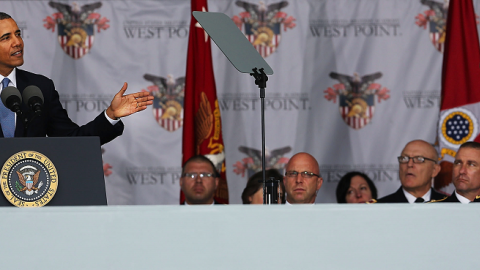President Obama’s speech at West Point yesterday was touted in advance by his team as an important opportunity to lay out his vision for American leadership in the world. In that sense it was a success, in that there was indeed a vision, and that it was laid out. But the victories stop there, for the speech and for American foreign policy.
In conversations with colleagues who bemoan the President’s seeming disinterest in assertive American leadership, I often remind them that he is very effectively broadcasting on the carrier frequency of American public opinion. The foreign policy of the Obama Administration is designed not to protect, advance, and sustain the position of the United States in the world, but to do as little damage to the President’s domestic agenda as possible. Indeed, for weeks now the White House has been leaking that President Obama’s foreign policy mantra is “don’t do stupid stuff.” And it seems to stop there. He—like the country as a whole—is focused inward. He and his approach are far better tuned to the political environment in the United States than the more assertive and engaged policy that I and others might prefer. It is we who are out of step with the country, not the President. Time will tell whether the President’s political judgment is matched by his strategic judgment.
Yesterday’s speech does little violence to the President’s symbiosis with the prevailing winds of public opinion, as most disinterested Americans would find nothing objectionable in what he said. He effectively threaded the rhetorical needle of marrying full-throated American exceptionalism with a series of straw-man arguments against military intervention. In the President’s mind, there is the over-reach of his predecessor, there is the isolation of the past century, and there is his wise path, laid out in four broad ideas. His words were powerful and direct, and – if one does not think too hard about the linkage between words and deeds – comforting.
First, he established his credibility with “national greatness” Americans by restating his past commitment to using military force where core interests demand it, unilaterally if necessary. The speech did little to expound upon what the President would have us believe are core interests, and I get the feeling he prefers it that way: fungible, temporal, situation dependent. In essence, a core interest worth fighting for creates a “red line,” and while he has drawn such lines, he did not, in the event, follow up on their enforcement. Fool him once…
Where the threat is not a direct one, the President spoke of mobilizing partners and of collective action, both of which are sound, if difficult objectives. That said, the absence of such conditions should not hamper action worth doing. For instance, if we had information on where and how the young Nigerian girls kidnapped by Boko Haram were being held and the capability to carry out their rescue, would we wait on some kind of coalition to form in order to attempt it? The point is, there are “non-core” interests worth pursuing unilaterally and we should understand that.
Second, the President re-asserted the primacy of terrorism as the most important direct threat to the nation, though he derided those who would advocate a strategy of “…invading every country…” harboring terrorists (whoever they may be). This position again plays to the crowd, to Americans who can still remember devastating terrorist attacks on our soil but who have forgotten the horrors of great power competition. He defended the right to pursue terrorists wherever they may be, under certain conditions of course. Among those conditions appears to be the notion of not creating more enemies than we take off the battlefield. How this is measured, I cannot with certainty say. This is clearly a reaction against what the Obama Administration views as the fallout of his predecessor’s policies. As a hard and fast rule enforced absent context, this condition might put one at a disadvantage against an opponent without the same sensitivities.
More importantly though, the President – while mentioning Chinese actions in the South China Sea and Russia’s activities in Ukraine – fails to grasp or even evince concern that great power competition is on the comeback trail. Such a competition would be incredibly injurious to Mr. Obama’s attempts to remake American society: one can wage an aggressive war against terrorist networks at a fraction of the cost of deterring conventional major power conflict. As for his assertion that we have a military with “no peer”, he is – for the time being – correct. Yet the trajectories of our drawdown and China’s buildup present a difficult match for the United States that is on course to become deeply apparent in East Asia by the 2020s. Were we to continue to fixate on terrorism as our greatest threat, we would surely accelerate that imbalance and make such a war more likely.
His third tenet is to strengthen and enforce the international order. He is absolutely correct when he asserts that respecting international law is not a sign of weakness, but he is absolutely wrong in implying that a failure to sign the United Nations Convention on Law of the Seas somehow emboldens China in the South China Sea. There are good reasons for the United States to sign the treaty, but they are irrelevant to China’s actions in the here and now. His reference to climate change as a “creeping” national security threat (which would necessarily require collective action to address) dramatically overstates the case, unless one sees a three hundred year horizon as somehow appropriate for national security policy-making.
It was at this point in his speech that I experienced an inability to suspend willful disbelief, when the President said “I believe in American exceptionalism with every fiber of my being. But what makes us exceptional is not our ability to flout international norms and the rule of law; it’s our willingness to affirm them through our actions.” Three phrases, three seriously dubious contentions. His conversion to American Exceptionalism seems feigned, as he has already made hash of his view on the subject before an international audience when he said, “I believe in American exceptionalism just as I suspect the Brits believe in British exceptionalism and the Greeks believe in Greek exceptionalism.” In the second phrase, the President seems to indicate his understanding that there are those who see America’s greatness as bound up in international banditry. Who are these people? What office do they hold? And finally, in the third phrase, he asserts that the essence of American exceptionalism is bound up in our willingness to abide by international norms and the rule of law. Many nations, including our own, do this routinely in ways large and small. Is our status as exceptional underwritten solely or largely by our capacity to do what virtually all other nations do? How is this exceptional?
Fourth and finally, the president asserted his willingness to act on behalf of human dignity, which he declared to be a matter of national security. Hearkening back to his first point though, the question remains whether it is a “core” interest. If so, how then would this be any different than George W. Bush’s “freedom agenda,” which was centered on the promotion of human dignity and liberty? If it is not core, would we be willing to intervene to support it without a coalition? One has to consider the ongoing situation in Syria when dissecting the logic of this point.
The bottom line is that the President is giving the American people what they want to hear. They want to hear that we are exceptional and great, and that this status is a birthright and does not require cross-generational devotion of effort to sustain. They want to hear that we are world leaders without having to consider what world leadership requires. They want to believe the narrative, the narrative that our President is ably providing us.
But this is not the job of the President, at least it has not been the job undertaken by great Presidents. Great Presidents lead the country; they listen to it, then they guide it in the direction leading to the accumulation of American power, greatness, influence and admiration. They explain what is required and why. They recognize the threats of an often cold, dark world and they convince the nation that excess caution and risk aversion are the pathways to decline. President Obama is making a short term political calculation designed to ensure a fundamental domestic remaking of the country at the cost of long term power and influence in the world. The only question is whether the American people will ultimately recognize this before the consequences are irreversible.




















